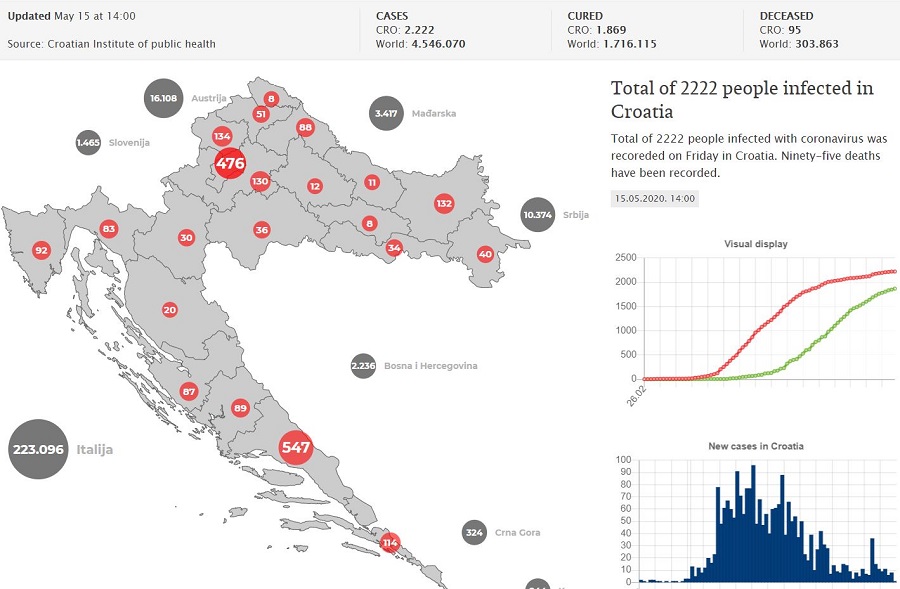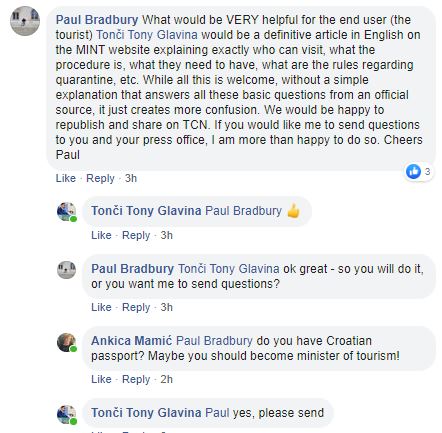Coronavirus Pandemic Highlights Old Problems of Justice System
As Lucija Spiljak/Poslovni Dnevnik writes on the 17th of May, 2020, due to the coronavirus pandemic, court hearings in Croatia were postponed and business meetings and consultations with clients within the scope of the provision of legal services were also cancelled. Attorneys and other officials in the field sought to hold meetings remotely and communicated with their clients by telephone and electronically.
This was explained in further detail by Kristijan Horvat, a lawyer who works with his colleagues in the Horvat & Zebec & Bajsic Bogovic law firm, in which four lawyers and five trainee lawyers work, along with the administrative staff.
As the courts are working at a reduced capacity due to the ongoing coronavirus pandemic and are as such only dealing with emergencies, the situation with the Croatian judiciary is following the trend of inactivity that the Croatian economy has been following itself. According to Horvat, parties' questions mainly referred to the exercise of the right to the array of measures introduced the Croatian Government for the preservation of jobs, as well as to requests and advisory services related to the termination of employment contracts.
He added that claims for compensation owing to the violation of the right to a trial within a reasonable time are yet to come. Zagreb was also hit by a strong earthquake that damaged some of the court buildings back in March, to the extent that work or access to those buildings was rendered impossible.
Despite the numerous negative effects of the coronavirus pandemic, the fact that the Croatian courts weren't operating didn't prevent parties from submitting various submissions and filing new lawsuits, but, as Horvat explained, the courts will be able to act on those things only when they resume their normal way of functioning, and that only from that moment on will it be able to take the proper legal actions and engage normally.
On April the 9th, 2020, the Croatian Bar Association proposed to the Ministry of Justice to take the necessary steps and introduce measures to ensure the technical conditions for holding hearings and presenting evidence at a distance using audiovisual devices were fulfilled. Nothing, however, came of that proposal.
There are ways to organise the work of the courts, including court hearings in these conditions: maintaining social distancing when the courts process cases where they have one party, and by video link, which is already a practice in foreign courts and is also allowed in Croatian law.
"The coronavirus pandemic has brought the old problems of the Croatian judiciary back up to the surface again in the form of the age and the arrangement of court buildings and premises, the technical equipment in the courts, and so on. The decision determining the fulfillment of the conditions for electronic communication in all municipal courts, all county courts and the High Commercial Court of the Republic of Croatia is welcome,'' concluded Horvat.
Make sure to follow our lifestyle page for much more.
Croatian Traders Express Dissatisfaction With Ban on Work on Sundays
The ban on the work of shops on Sundays has been a talking point for quite some time now. With some being firmly for the idea of keeping Sunday a free day on which shops don't operate, and others, primarily Croatian traders, being entirely against it.
Many Croatian traders are constantly claiming that such a move further damages an already less than ideal economic situation and that this will only become exacerbated in the uncertain times we're currently living in owing to the coronavirus pandemic.
The Croatian economy, much like every other economy across the globe, has been suffering the blows of the coronavirus crisis. Many argue that forcing shops to shut their doors on Sundays will do absolutely nothing to help get the economy back on its feet again, and Croatian traders are growing more and more frustrated.
As Novac/Ivanka Toma writes on the 16th of May, 2020, the Croatian Employers' Association (HUP) and the Trade Association addressed the Ministry of Economy and the Ministry of the Interior with a proposal to relax the measures which are still in place in attempt to slow down the spread of the new coronavirus, COVID-19.
Specifically, this group of Croatian traders demanded that the ban on the operation of shops on Sundays and non-working days be lifted, and that what is known as the ''disinfection break'' also be lifted.
These Croatian traders pointed out that banning work on Sundays isn't an adequate anti-epidemic measure because restricting work on Sundays only works to significantly burden other working days, especially Mondays, Saturdays and Fridays, and creates the potential for much larger crowds of customers on the other days of the week.
They also pointed out that due to inaction, a smaller number of working hours are actually being realised in total due to the ban of shops operating on Sundays, which will have the consequence that traders will need to start firing their staff.
They also stated that the one-hour break required to disinfect the store has no effect because after that break, queues get formed outside of the shop doors and the level of pressure on staff working at cash registers increases. They also warned that such measures don't apply to those in the caterering and hospitality industry, to hotels, or to those carrying out other personal services. However, this group of Croatian traders believe that it is more than likely that nothing will come of their proposal.
''We've already communicated with the public and employers about why Sunday has been set up as a non-working day. By extending our working hours during the week, we got more working hours and two shifts, we wanted to relax certain economic activities on the other side of the scale, and on the other hand, we wanted to prevent the spread of the virus. Every day we're looking at the measures and the situation and the possibilities we have for balancing that scale,'' said the director of the CNIPH, Krunoslav Capak, in response to the question about the proposals of Croatian traders.
Make sure to follow our business page for much more.
Croatian Tragedies: Health v Economy, Politics v Tourism
May 17, 2020 - Croatian Tragedies. As it seems that health and tourism are the priorities, has the focus of Croatian authorities moved elsewhere until Election Day?
We are all intelligent people, so I want to keep this short.
Croatian Tragedies 2020.
The timeline.
Corona arrives on February 25, 2020. How to deal with it?
RESPONSE: A reassuring display from new Health Minister Vili Beros. Communications like no other Croatian minister in living memory. A reassuring start. A website, an app, a Viber channel with daily updates to half a million people, a social media channel follow. Croatia is praised as one of the top response countries in the world.
It is the economy, stupid.
RESPONSE: Croatia's private sector finally get frustrated enough to create the association Glas Poduzetnika (Voice of Entrepreneurs).Very quickly they get organised and bring about positive change.
Tourism is only 20% of Croatia's GDP, so not much of a big deal. This pandemic might slow things down, however.
RESPONSE: Officially, Tourism is King, let's portray that message. Unofficially - see below.
Yes but what about the elections? If we don't get reelected, who cares about corona, tourism or the economy?
RESPONSE: Jebiga
My trip to the Slovenian border to see the situation today was highly illuminating.
I am a Dalmatinski Zet (a Dalmatian son-in-law) and one of the phrases I have learned here is 'daj mi nesto konkretno' - give me something concrete.
Can I travel to Croatia right now?
What happens at the border?
What are the rules and regulations?
What are the social distancing rules?
And 67 more questions of a similar ilk.
Are there answers to these questions? In English? Officially? Online, accessible and advertised?
I learned something at the border today. I learned that there are strict rules for entry to Croatia, and I felt safer.
The problem, though, is that that message was not really going out to the people who need to hear it the most - the people who contribute to 20pc of our GDP.
The trip to the border was really interesting. I was allowed to walk in the beauty of the Bregana No Man's Land, between the two countries.
The land between the Croatia Slovenia border is one of the greatest Balkan meeting points, a meeting point between the West and the Balkans.
I looked at the trucks inching slowly and I cursed my early start. How is it possible in the Information Age that we cannot find out concrete info about crossing the border in the Corona Age?
It got me thinking, and I will leave you with some questions.
1. Where do tourists go for the latest info about Croatia?
2. Do we still need 319 tourist boards, and what should be their role if yes?
3. Election season has started. Who will win, and what impact will that have on Croatia's approach to health, economy and tourism in the corona era?
4. It the Minister of Health can produce a website updated daily (and in English), a Viber account update, which sends the latest info to half a million people, why can't the Ministry of Tourism do exactly the same thing? What exactly is the minister doing all day apart from spouting legendary corona-era metaphors such as Croatia Breathes Tourism. Yes, he really did come up and publicly trumpet that pearl
Who will win the real election - Health, Economy, Tourism, or Politics?
Here's what I think is happening. It is just a personal opinion, but the border visit made me more certain.
The elections are in a few weeks (late June or early July). The economic downtown has not yet really started, so the sooner the election, and the more we can make people think things are going to be no so bad, the better chances of reelection. Staying in power is obviously more important than doing the best for Croatia and its citizens.
The approach to tourism is tricky for health, economic and political reasons. The economy needs tourism to start, the epidemiologists would prefer it didn't, and the politicians can't afford to take a decisive side on health v economy, as to do so would alienate some voters in the forthcoming elections.
There are other issues with tourism. If we open the borders to some EU countries, my understanding is that we have to open them to all, regardless of their rate of infection. The joys of being in a large family.
From the health persepctive, having a million tourists descend on Croatia would be a disaster, and the authorities would not be able to control things. So if we have to let the whole of Europe in and cannot control those numbers, we need to find a way to limit that. But at the same time, we have to show how busy we are to the domestic voters. We are breathing tourism in the corona era, after all.
How to convince local voters things are going swimmingly, while preventing millions of tourists from overwhelming the system?
The answer is simple - give different messages to tourists and the domestic audience. Make the local people think we are working hard to bring in those desperately needed guests, while keeping tourists largely in the dark about the current situation so that they don't come en masse and overwhelm the system.
It is a really different balance to get right, but if you take the politics out fo the equation, it is actually quite easy to manage. Transparently. With clear information for all.
The big thing I learned at the border is that those who were allowed in will have their holiday tracked. The authorities will know where you are staying, have your contact details, and be immediately able to find you in the event of an infection in your contact group. This is somewhat reassuring. As I saw with my own eyes, people simply coming to Croatia and thinking they can choose their accommodation and destination once they arrive are not allowed in.
So the obvious conclusion is that Croatia welcomes tourism, but it can only handle a certain number at one time and track their whereabouts. Due to EU rules, if they open for one country, they have to open for all. Is it possible to come up with a system that could deliver tourism for all, while limiting it to the maximum number that Croatia can handle and monitor in these unusual times?
Yes, but only if you take out the politics.
I have no idea what the maximum number is, but the police will. Let's call it 100,000 for this discussion.
Let's divide that into 50,000 for tourists, 50,000 for those coming on business and with holiday homes in Croatia.
For the tourists, technology is your friend. On a first-come, first-served basis, contact the first 50,000 people who made reservations to come to Croatia this summer, tell them that they can come but need to confirm within 48 hours. For the businesses and holiday homes, first come, first served. Get them to register all the info you require (length of stay, address of accommodation) on a website you manage to cut bureaucratic times at the border. The first 50,000 will come at different times, so effectively, you need to create a giant Airbnb booking calendar with 50,000 spaces. It may sound a massive job, but I bet there is someone in Croatia's amazing IT sector who could come up with a solution quickly. If you were really clever, you could then allow more tourists to Istria, for example, if the system capacity was stronger there.
Communicate that information transparently in Croatian to the voters, in English to the world. It will show that Croatia is serious about its guests, not just trying to grab every kuna at the expense of health, it will reassure tourists, and it will add to one brand that Croatia rarely uses but will be increasingly important - safety.
And if anyone has the mobile number of the Minister of Health, perhaps you can fax it across to the Minister of Tourism so that he can find out how to do the Viber or even WhatsApp daily travel update for tourists (which could include some sexy offers and info about Croatia and be a great marketing tool).
Just as Croatia apparently breathes tourism, dear Minister, so the people who provide 20% of your country's GDP breathe information.
This is what I learned about the current rules crossing the border with Slovenia.
For the latest on the coronavirus crisis in Croatia, follow the dedicated TCN section.
Who Can Cross the Croatia Slovenia Border? Who Cannot? A May 17, 2020 Border Visit
May 17, 2020 - In the absence of clear travel information, TCN visits the Croatia Slovenia border to find who is - and who is not - allowed to cross the border into Croatia. It was an illuminating visit.
Are Croatia's borders open or not? If yes, who can cross them, and under what circumstances? With so many tourists wanting to come, can they jump in the car and come?
After Croatia led the world in clear communication on the health aspects of the corona threat, that clarity seems a distant memory. Stories of foreign tourists entering the country are flooding the media, and it seems that the season is starting. But is it?
Here is the official COVID-19 page from the Ministry of Tourism which one would hope would provide the answer. If you can find it, you are a better man than me.
According to the Croatian National Tourist Board recently revamped travel info page, all the answers can be found at a very helpful email address. Insider tip - good luck with that one from personal experience.
Here is some useful info from Croatian Roads (HAK), but with all those specific questions resting on the Ministry of Tourism responding to an email.
I am still trying to find out the actual procedure for crossing the border. As my colleague patiently waited for the email reply (now Day 4), I concluded that there was nothing better than finding out from personal experience.
Why not go to the Croatia Slovenia border myself and see what is happening. As these are sensitive times, I contacted the Ministry of the Interior of both Croatia and Slovenia, stating my intentions and asking for their assistance.
Croatia 1, Slovenia 0.
I received an automated response from the Slovenians the next day (in Slovenian). I have heard nothing since. From the Croatian side, I received this:
Dear Sir,
we agree with the recording at the said border crossing, without statements from police officers and other officials.
Please comply with the Law on State Border Surveillance, follow the instructions of police officers and keep your stay at the border crossing to a minimum.
The same is necessary for the smooth implementation of measures and actions carried out at the border crossing.
We also confirm that we have received your inquiry sent to us on 15th of May 2020., and we inform you that we will send you an answer when we gather all the necessary information.
Best regards,
There are three border crossings just outside Zagreb around Bregana, and I decided to visit all three, the two small ones first.
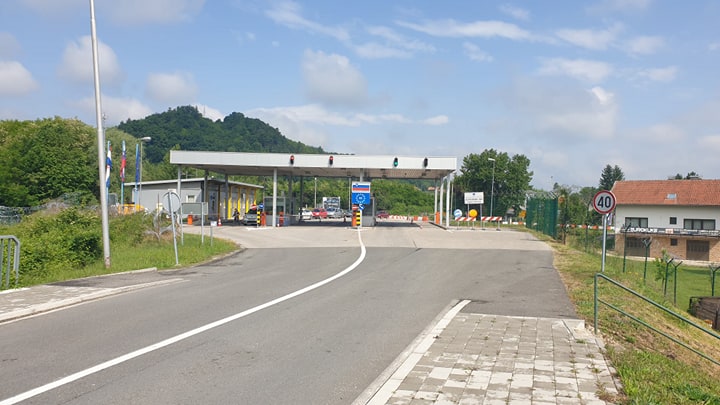
The first was quiet, with just a few cars coming from the Slovenian side. The Croatian border official was polite and let me proceed to her Slovenian colleague, who declined to answer questions as I didn't have a Slovenian official approval.
There were a couple of Slovenian bikers who were happy to talk to me. This was not their first time across the border. They had a business in the next village, all the appropriate paperwork, so the crossing was problem-free. Get the necessary paperwork, an invitation from a Croatian business, for example, and all is fine.
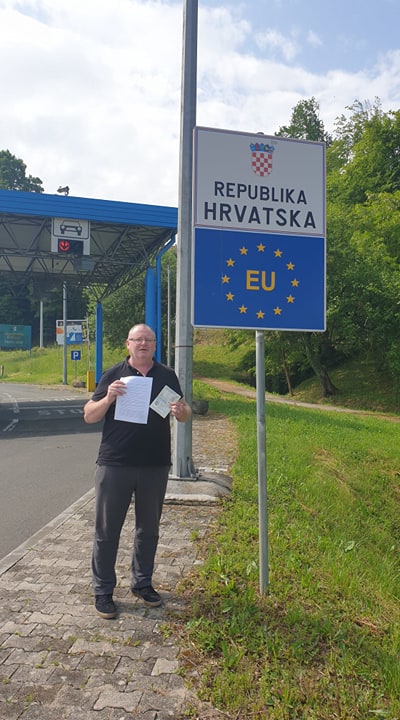
I was planning to film a video report but I now how sensitive the police are about filming at borders. Ok, true story - I left my phone charger in Dugopolje and my phone died.
I did get a copy of the recommendations (and in English!) for each tourist arriving. You can see the advice at the bottom of this article.
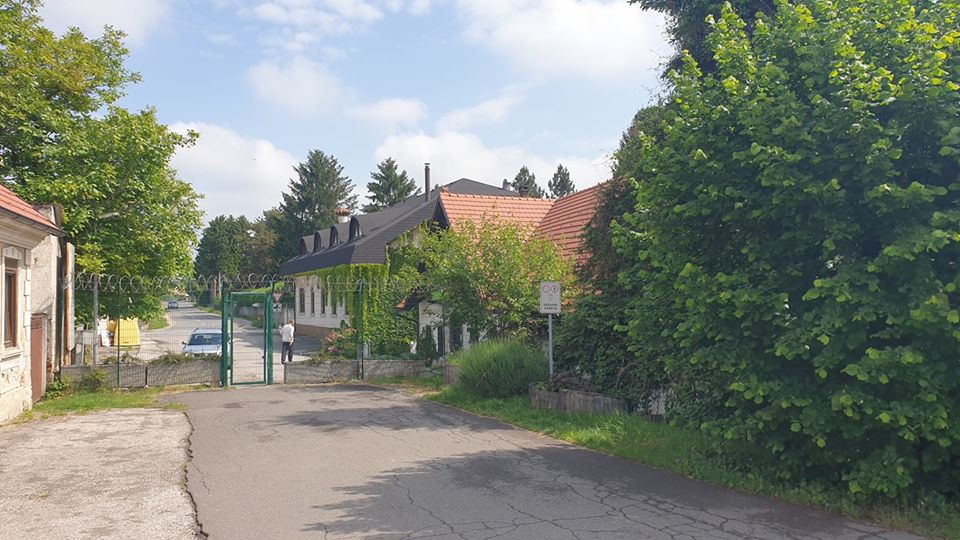
Next up, the best Croatia Slovenia border of them all (if you really want to research the subject, here is the Total Croatia guide to crossing the Croatia Slovenia border in normal times).
Before the migrant crisis, this border had one of the coolest border restaurants ever - the bar was in one country, the toilets in the other. Imagine having to leave the Schengen zone to pee!
The restaurant is now closed for normal service, but it does still service groups, the owner told us through the gate today. But the erection of the wire and gate during the migrant crisis killed all business. The border is normally open from 0600 - 2300, but has been closed these past few weeks - and remains so.
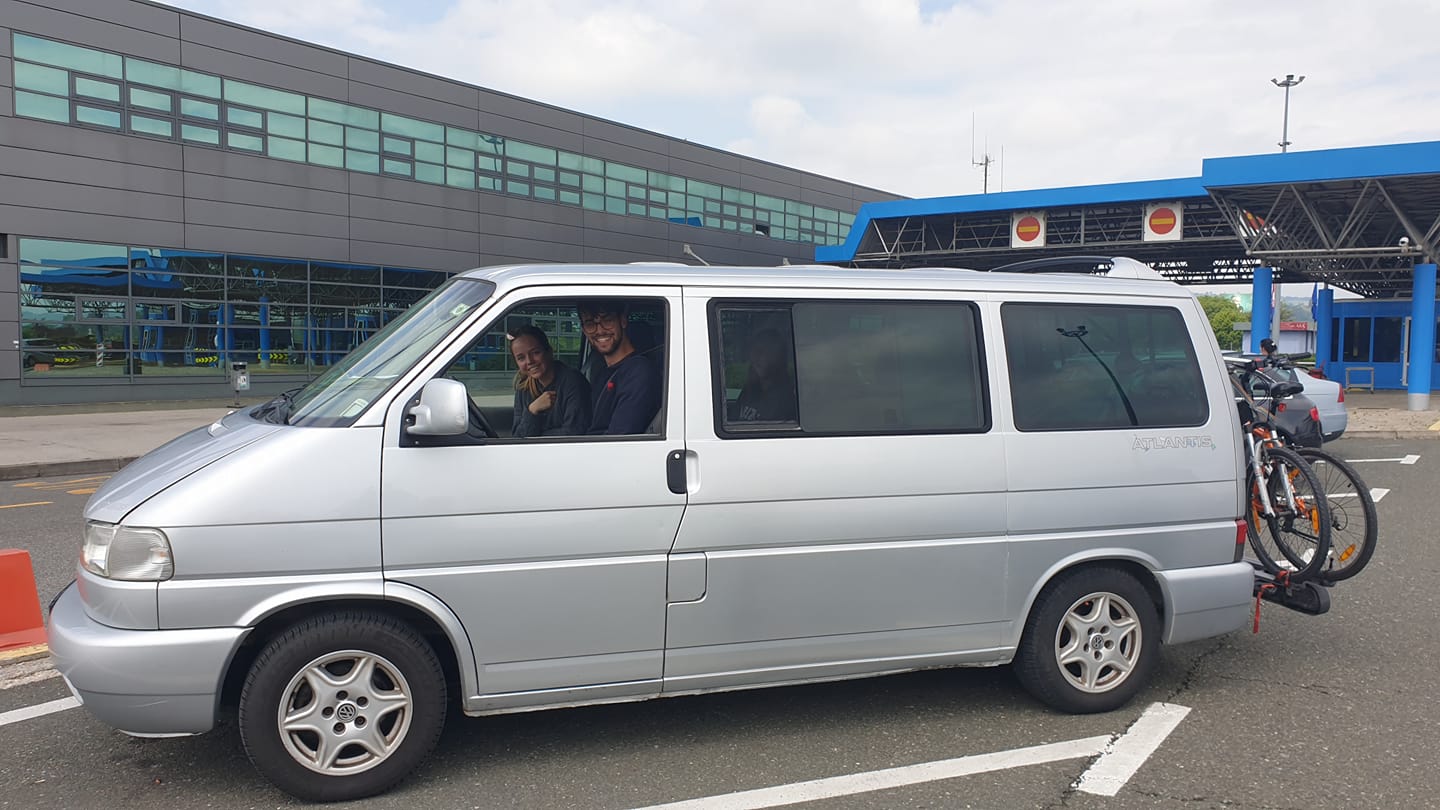
I introduced myself to the Croatian police, who were very polite, helpful and efficient. My documents checked, I was free to observe and to talk to people travelling both ways. I really liked thes happy Slovenians, who had been following the local news and got everything in place regarding paperwork. They were off to a campsite on Krk where their family had a property, and they made sure they had an official invitation, with a stamp for good measure.
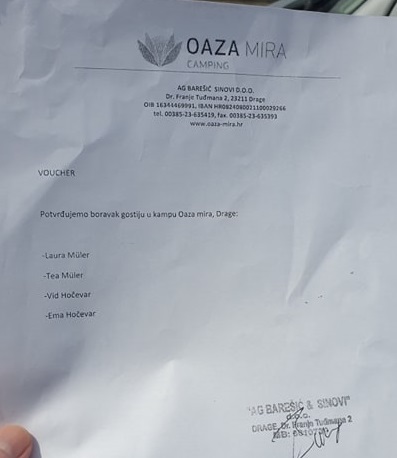
Now that the borders in Slovenia are open, they did not have to worry about self-isolation on return. This is an issue which people are asking about. Until I get official answers, all I can say is talk to your embassy about the latest info, both incoming to Croatia and when you return home. They will have the best (and official) info.
There were lots of foreign plates, mostly German, but few foreigners. The Croatian diaspora returning home from Germany, Austria, Holland. A Montenegrin living in Munich, who has been going back and forth for weeks.
Processing time was about 5 minutes per car, but this was the process that reassured me. For the word in Croatia is that the borders are open, which is great news for tourism. But it would be highly irresponsible to simply let everyone in without knowing where they are going.
And not everyone is getting in.
Currently, you can pass the border as an EU citizen if you have an official business invite, own real estate, or can prove a tourism reservation in a hotel or similar.
And if you can't, you don't come in.
The idea, I realised, is the ability to control the information in case of trouble.
The transit process (and PLEASE note, this is just the Croatian border, I did not get permission for the Slovenian one, is that you can rock up at the border, show your ID and certified reservation or business invite, or real estate papers, and be allowed in. They will want to know how long you will stay, address and your contact details, as well as physically showing your invitation. The registration process is a swipe of your ID, but then the time-consuming process of manually adding details of your invitation, contact details etc. Necessary but time-consuming.
By controlling the whereabouts of tourists who enter, it seems, this is how Croatia will control the corona threat. And not everyone gets in...
My favourite moment was the pre-crossing chat with a Slovenian guy from a local town. He winked and told me he was off to see his Croatian mistress for lunch and a bit of fun. Unfortunately, his illicit lover was left a little frustrated, as they both forgot to sort the official invite (presumably the wife might have found out). No entry.
Two very jolly Slovenian ladies of a certain age were thrilled to be able to get to their beloved Adriatic. They had no plans, the borders were open and they would decide where when they felt like it. No entry.
A Croat from Germany with a business meeting to attend in Zagreb. The invite consisted of an email. After a long discussion (and some phone calls), he was allowed through. Lesson learned and top recommendation - get a proper, stamped invitation. It will save time for you and all behind you, and will eliminate the risk of refusal.
And that's as much as I can tell you, as someone not part of the system.
Check before you travel, make sure you have the documentation ready, and you should be fine.
Recommendations and instructions of the Croatian Institute of Public Health.
Croatian and foreign nationals entering the Republic of Croatia must comply with these recommendations and instructions in the period of 14 days following their crossing of the state border, as follows:
During the first 14 days following the entry into the Republic of Croatia, accommodation may be left only in absolutely necessary situations:
carrying out business activities if business was the purpose of entry into the Republic of Croatia, carrying out necessary activities with continuous increased hygiene measures in place.
When leaving accommodation in absolutely necessary situations, it is recommended to wear a mask or a covering for the nose and mouth, to keep a physical distance from others (a minimum of 1.5 meters) and to practice hand hygiene.
Hands should be washed as often as possible with warm water and soap and/or a hand disinfectant should be used that needs to be well rubbed on the palms.
Touching one's face, mouth, nose and eyes should be avoided.
Using public transport should be avoided.
ln the means of transport, a person should preferably be alone or exclusively with persons with whom he/she shares accommodation.
Grouping and public gatherings should be consistently avoided.
During business meetings, it is necessary to meet with as few persons as possible, to ensure a physical distance of 1.5 meters and availability of disinfectants, to avoid unnecessary meetings.
During their stay in the accommodation, the persons concerned prepare the food themselves or use food and beverage delivery services.
Payments are made by using non-cash card payments or online services.
Body temperature should be measured every morning. lf it exceeds 37.2 degrees, it should be taken again after 10 minutes. lf the temperature again exceeds 37.2 degrees, the person should stay at home/one's accommodation and contact the chosen general practitioner,
if any (Croatian nationals), or a competent local epidemiologist.
ln case of any symptoms of acute respiratory infection (cough, sore throat, high temperature, short breath/difficulty in breathing, loss of smell and taste), it is necessary to stay at home/your accommodation and contact the chosen general practitioner, if any (Croatian nationals), or a competent local epidemiologist.
ln case of sudden onset of severe, life-threatening symptoms, the person should contact the emergency medical services.
ln case of respiratory disease symptoms.
lf you develop respiratory disease symptoms (high temperature, cough, shortness of breath, difficulty in breathing, sore throat, weakness), you should contact your chosen doctor by phone who will, based on your medical condition, assess the need for you to be tested for the new coronavirus.
lf you require medical assistance for reasons other than a respiratory disease, you should phone your chosen doctor or one of the members of your household can contact the doctor for consultations and arranging a house call.
Do not visit healthcare facilities without having previously contacted them by phone.
You can find more information on the coronavirus disease and measures for reducing the risk of spreading the disease on the website of the Croatian Institute of Public Health, or from your chosen general practitioner and a competent local epidemiologist.
When Will Health Tourism Resume in Croatia? Italians Eager to Travel for Services
May 17, 2020 - After health tourism came to a halt because of the coronavirus pandemic, the owners of dental offices and polyclinics in Croatia are waiting for the borders to open again. The return of guests from abroad is also desired by other health care institutions that realize part of their income from the provision of services to foreign clients, such as cosmetic surgeons or spas.
Novi List reports that it is estimated that the daily consumption of wellness users last year was almost 150 euro, in spa tourism 60 euro, and in medical tourism 240 euro. According to official estimates, health tourism brings in about 500 million euro a year, and mostly hosts residents of Germany, Slovenia, Austria and Italy. As it turned out, the Croatian border today is no longer an obstacle to the arrival of foreign clients who are interested in dental implants or breast augmentation, because, in principle, anyone who books a hotel room can enter the country. But the Italian border, for example, is still closed, while most other countries still have rules stricter than ours. The largest number of clients of dental institutions in the Primorje-Gorski Kotar and Istria counties come from Italy.
"We had to cancel a number of appointments in the last two months, and the situation became more complicated for our clients during that time. We are waiting every moment for the borders to open, and according to the information we have, they are ready and eagerly waiting to come," says Zeljko Miljanic, the founder and owner of the Rident Polyclinic.
It is customers from Italy who make up 90 percent of their customers. Due to the closure of the borders, 210 employees in the three polyclinics have been at home for two months, on hold, hoping that the borders will finally open. So far, says Miljanic, they have managed to get through this time without firing any employees, but if something does not change soon, it will not last long. "And the includes maintenance and investment are extremely large for us," he points out.
"As health tourism, we are the second most profitable activity in the county, and I hope that the local self-government will start thinking about the fact that many people will depend on us, on the tax and surtax we pay," says Miljanic.
He hopes that the Italians will get permission from their authorities to leave the country in June, which would allow our entrepreneurs in the field of dental tourism to continue working. The Croatian Chamber of Dental Medicine (HKDM) says that the resumption of work with foreign clients will not happen overnight, but they expect things to return to normal gradually.
"Given the dynamics of the gradual, phased withdrawal of protective measures in Croatia, as in other European Union countries, we expect an adequate gradual return to everyday life, which includes the provision of comprehensive dental care in dental offices to foreign nationals. Providing these services to the extent we had before the pandemic was declared will certainly not be overnight, but the quality dental services provided by foreign patients in our surgeries will continue to be interesting for foreign patients, who we believe will continue to show interest in dental tourism services in Croatia," says the President of the Chamber, Hrvoje Pezo. He points out that the maximum caution and protection of both the foreign patient and the dental service provider is extremely important.
The protocol of treatment is elaborated in detail, so the rules of conduct and personal protection are well known when you come to the dental practice. At the Rident Polyclinic, they point out that they had extremely high standards of protection even before the coronavirus epidemic, which is confirmed by the fact that despite the large number of clients from Italy, they did not have a single case of coronavirus infection just before the border closed.
"Back in February, we had clients from the zones in Italy that were most affected by the infection. Despite that, no dentist has contracted COVID," Miljanic points out.
Today, the rules for crossing the Croatian state border are such that for a foreign citizen to enter the country, it is advisable to contact the border police by e-mail, if a person wants to be sure that he will not be banned from entering Croatia. The Chamber points out that their members are ready to help their clients in this.
"Dental doctors are ready to help foreigners in collecting the necessary documentation related to entering Croatia for the purpose of providing dental care. However, the details of crossing the border, as well as countries in transit, need to be elaborated in more detail and certainly enable the simplest possible entry procedure, which in accordance with EU directives ensures free migration of EU citizens and citizens of other countries," says Pezo.
The coronavirus pandemic has taught people to be careful, and the question is how many Italians will go to the dentist in another country during a pandemic, albeit on a much smaller scale than a month or two ago. As in general tourism, caution could significantly reduce the number of foreigners coming to Croatia. The Chamber of Dental Medicine is aware of this problem, but still believes that the interest of foreign clients will not be absent.
"At this moment, it is necessary to create preconditions for the re-migration of patients, both Croatian and foreign citizens. European Union countries are cautiously withdrawing protective measures that will rekindle the interest of foreign clients, since Croatia is an interesting destination, and the dental services themselves are at an extremely high level of quality, which foreign patients have recognized," says Pezo.
He adds that the chamber has developed professional guidelines for full-scale work during the coronavirus pandemic, which guarantees maximum protection for all patients.
In the last two months, the Chamber has continuously cooperated with the Crisis Headquarters at the Ministry of Health, and as a professional organization of dentists, dental technicians and dental assistants, pointed to professional guidelines based on scientific knowledge and experience in the everyday practice of dental practices. "All decisions of the Crisis Headquarters were implemented at the county level, where, in only a few cases, the organization of dental work was specific. In an effort to help its members, the chamber gave its suggestions in writing, which were accepted by these counties," they point out.
The losses in health tourism are huge, as in other parts of the economy. In dental tourism, the drop in traffic is up to 100 percent. The economic aid measures adopted by the Government, including dental medicine, will, they say, alleviate the financial difficulties of dentists and dental technicians, but they hope that there will soon be economic growth in their business.
"Losses in dental tourism are 100 percent, which is why the Chamber is cooperating intensively with the Ministry of Health and the Ministry of Tourism on the reactivation of dental tourism, because health tourism, due to its advantages, could be a lever for tourism in Croatia," Pezo said. The advantages of health tourism are related to the fact that there is no seasonality, so it is tourism that is current throughout the year, patients are tied to one place, or to the health institution they come to, can be kept under health supervision. A special advantage is that health professionals who provide health services have professional knowledge and appropriate education and can adequately take care of all necessary protective measures, according to the Chamber of Dental Medicine.
Cosmetic surgery is in a slightly more favorable position, which depends to a much lesser extent on foreign clients. At the Zoran Žgaljardić Center for Aesthetic Surgery, foreign patients make up only 20 to 30 percent of the total clientele. Despite this, they hope to return to 'normal' as soon as possible so that they can work at full capacity.
"There are interested parties whose operations were canceled last month and the month before last, and now they are calling to schedule a new appointment," says Žgaljardić, who is not convinced that opening the borders will quickly normalize and foreigners rush to our clinics.
"People have no fear if things are regulated. If we open the borders, a foreigner who wants to come to our clinic will receive an invitation letter for surgery, and then he will solve the rest in his country," explains the cosmetic surgeon.
He believes that the return of clients from neighboring countries will not happen so fast.
"People will be scared because things are not clear until the end. Each of us in this situation will have some priorities and security put in the first place, and something will be postponed for later," he believes.
But safety reasons, in his opinion, should not be an obstacle for someone to decide on an aesthetic procedure, without fear of infection.
"If you have a man who is healthy and if the instructions are followed, the chances of something happening are minimal. Our client, if he comes from abroad, gets in the car, crosses the border, has an operation, returns home. It is a closed story, the possibility of infection is reduced to a minimum. But people need to be aware that they need to be careful," he points out. He noticed that people in our country have become quite free, relaxed, and act as if it is not an epidemic. He is not very happy with that, because there is always a risk of the virus coming back.
"Some people relax and think it's not like that, but it is, no matter what they think about it. Some of us think it’s stupid to wear a mask, but I, as a doctor, don’t think so until a vaccine or cure is found. Everyone should think for themselves and take the strictest measures, that is the only thing that is intelligent in this situation," Žgaljardić points out.
In his clinic, they apply all prescribed protection measures, from disinfection to masks and visors. Visors are used in surgical procedures, especially the anesthesiologist during intubation, while he, as the doctor at the examination, wears only a mask.
"We start from the assumption that we work with a healthy person. We could also test our patients, but realistically he can get infected a few hours later. Testing is relative proof that a person is healthy," explains Žgaljardić. Ultimately, he adds, a patient can also be infected, but does not have to pass the disease on to anyone if everyone is properly protected.
Although cosmetic surgery is a branch of health tourism that could potentially suffer more than others, because it does not seem to be a priority, this interlocutor claims that this cannot be seen as such, and that the issue of cosmetic surgery and its urgency is very individual.
"Being a reward for some is a priority for others. Some people will never come to me, they will think it’s stupid, and others will. Physical disability is not an upgrade, it makes a person depressed, it brings with it another issue. Just because something is beauty-related doesn’t mean it has no basis for health. It is not, of course, cancer, but there are many other similar procedures on the body that do not have to be done, and they are important to people," Žgaljardić illustrates and announces that he is resuming his activity at a slow pace and with great caution.
"This year, we are all trying to survive, to stay afloat, and at the same time, we live in optimism," he concludes.
To read more about business in Croatia, follow TCN's dedicated page.
Croatian Government: Money to Help Workers in May Will be Paid
As Poslovni Dnevnik writes on the 16th of May, 2020, the Croatian Government's aid measures for the month of March were paid out by April the 15th, 2020. Now, given the fact that the 15th of May has passed, and the money has not yet been paid to everyone who is entitled to assistance of 4,000 kuna per worker, 24sata checked the information issued by the Croatian Government and whether or not it is true that there will be no money.
Rejecting such claims and obviously wishing to put an end to rumours of that sort, the Croatian Government has stated that the money is also secured for payments in May, and that it will be paid out in June.
''There is about 700 million kuna left to be paid out and it will be paid out week. Unlike the first round, checks are being done through the Pension Insurance Institute and through the Tax Administration, so it takes a bit longer.
We check the number of employees in each company that asked for help. Those who didn't receive the full amount for all of their workers also don't need to worry, although this is a small number of cases because it may happen that in one company, it might not be checked whether all of the workers are actually employed there.
The money is released in portions, and as soon as the rest of the situation is checked, the money arrives. We need to carry out these checks to avoid any irregularities. The money is there and will be provided for both April and May in the budget and business owners don't need to worry about it,'' stated the Ministry of Labour.
About 570,000 workers are expected to receive aid from the economic measures passed by the Croatian Government in April. About 1.6 billion kuna has already been paid out, with the aforementioned 700 million kuna still remaining to be paid.
The same source told 24sata that money has also been secured for liquidity loans, and that applications are being processed. The calling of the elections and the dissolving of the Croatian Parliament will not affect the flow of the Croatian Government's aid, the source added.
To briefly recall, these government measures have been planned until early June, and after that they are due to stop, but the possibility is open for some to continue.
Make sure to follow our politics page for more on the Croatian Government.
Croatia, from Corona Comms Kings to North Korea: Can We Have a Tourism Viber Account?
May 16, 2020 - For a country so heavily dependent on tourism, communication from the Kings of Accidental Tourism is beyond sublime, a far cry from the outstanding communication from Vili Beros and team. What went wrong, and can we have a Koronavirus tourism Viber account?
Do you remember King Vili and Queen Alemka?
The very public and accessible faces of the crisis management team which has spearheaded the health response to the coronavirus crisis in Croatia. New Health Minister Vili Beros only came into the job on January 28, 2020, but he immediately brought in a sense of calm, order... and communication.
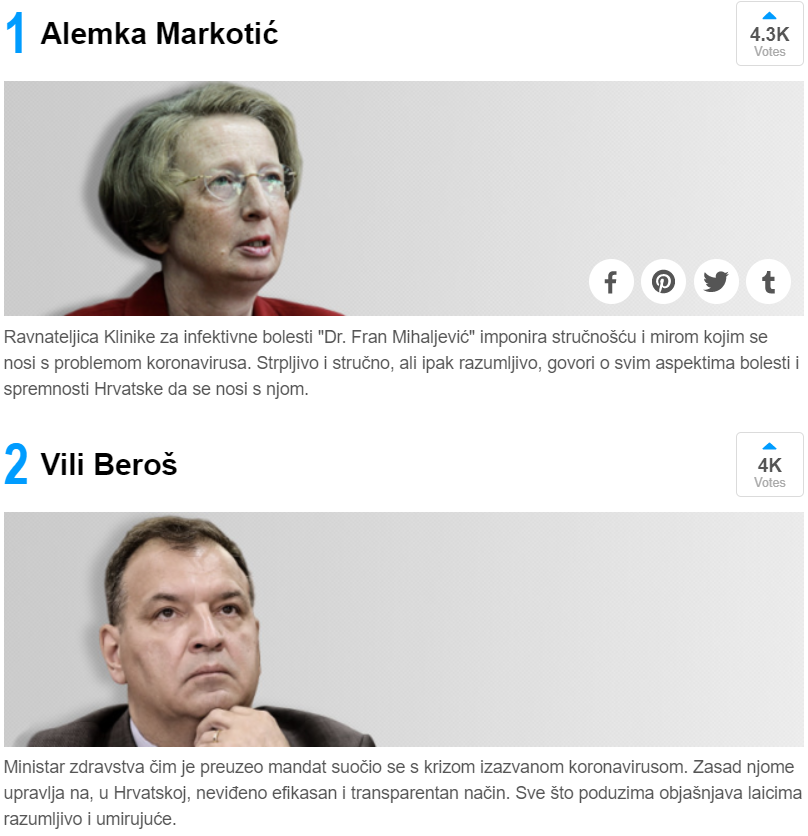
They did such a good job that they won the thanks and admiration of the nation. Here they are, number 1 and 2 in the last poll by Index.hr on the top 20 positive and top 20 negative people in Croatia. Number 2 Most Positive is not a position many ministers have held since polling began.
It wasn't just the health measures, however, it was the communication. It was beyond outstanding. I was full of admiration, gratitude and stress-free sleep. I knew that Vili was taking care of me while I slept, and I knew that he would explain everything he was doing, what I needed to do, and why, to get us all through this.
It actually felt for those giddy few weeks that I was living in a real country.
We got a dedicated Koronavirus website, which was full of incredible data, info and updates. It even had a section in English, something that many local tourists boards here cannot manage. The site was updated at 14:00 every day, to coincide with the daily press conference where Vili, Alemka and the team updated us live on television and took journalists' questions.
There was a Koronavirus Viber account you could subscribe to to get the latest updates - over 400,000 did in the first 24 hours. Since its inception, the Viber updates have been regular, updated and informative. There was even an Android app called Andrija just for corona.
And all this within the Mighty Kingdom of Uhljebistan. A Minister seemingly working for the people and not for himself. A surprising and refreshing change. Could this be one more step on the road to Croatia 2.0 and ridding the country of a far more difficult malevolent virus - Uhljebistan itself?
Sadly, those halcyon days look to be over.
Croatia's focus in the corona story shifted from health, health, health to health, health, economy (understandably). But now there is a third factor which will quite probably play the biggest role of all - politics. It is election season, baby, and reelection is more important of all in the Mighty State of Uhljebistan.
Tourism is now the focus - and how to 'save the season'. King Vili has passed over the stage to Minister of Tourism Gari Cappelli, whose ingenious corona-era slogan - Croatia Breathes Tourism - perhaps gives you an indication on where this story is heading.
The arguments about having a tourist season, who should come, and what level of measures should be taken are all part of very complex discussion. That is not the focus of this article. The focus of this article is how Croatia has gone from one of the global leaders in terms of corona communication thanks to Vili, Alemka and co, to the communication skills that would not be out of place in Pyongyang.
I am getting a ton of emails at the moment with questions like this:
I’m trying to find out if my holiday in June will be going ahead. It’s hard to find anything out from the airlines and the Croatian tourist board.
We are due to go Dubrovnik on June 17th for a week. I’m just wondering if you have any news?
Thank you
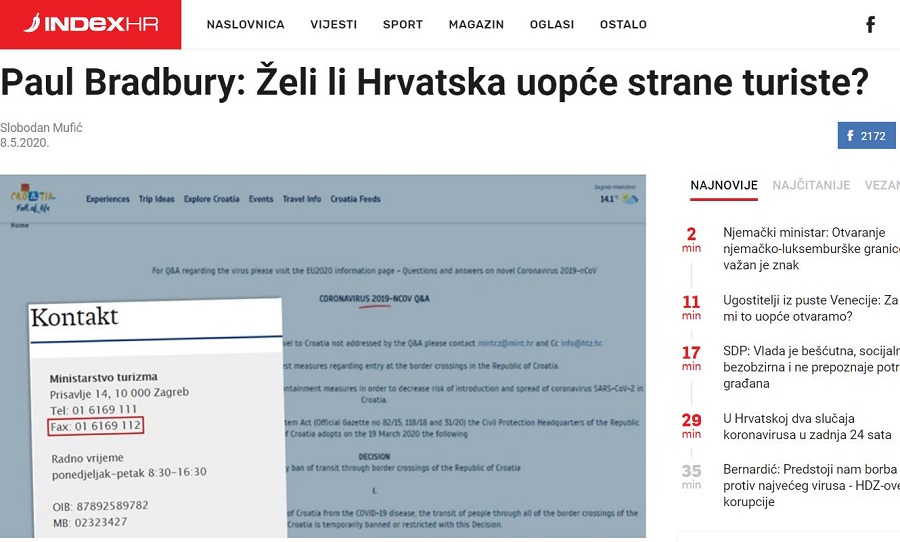
But frustrated and desperate emails from the people who were trying to save the season - foreign tourists - kept flooding the TCN inbox, as we were the only source trying to give daily updates from the info we could find after much research.
And then - at least I thought - a breakthrough of common sense. State Secretary of Tourism Tonci Glavina has always been one on the most communicative members of the government. Bilingual in language and mindset after studying in California, I posted the message above on his wall earlier this week. He was, as expected, responsive, and I agreed to send the questions to help the ministry do its job.
I sent 14 questions the same day, mostly generated by TCN readers, to both the Ministry of Tourism, press department and the office of the State Secretary (who had asked me to send them), as well as the press department of the Ministry of the Interior.
After three days, I had received no reply from anyone. I emailed the tourism ministry again, then called both the press department (whose job it is to talk to the press) and the office of the State Secretary. Silence. I then called Tonci's mobile and got a message that he would call me back.
Which he did. And we chatted for 40 minutes, off the record, so I am not at liberty to divulge the contents of that chat.
But I still have no answers the following day. And nobody else does either. Personally I am embarrassed on behalf of the public officials who continue to take salaries for such incompetence as so many are losing their livelihoods, but I have a simple suggestion which would solve all this information chaos in one go, while giving Croatia a great chance to promote special offers AND gather data on tourists via their data.
It is a simple idea. One which King Vili has been using for weeks.
Can we have a Viber account similar to the Koronavirus.hr, but focused jus ton tourism and travel updates. Daily border updates, flight info, update in measures, offer of the day, fun fact about Croatian tourism. A mixture of information to allow people to understand what is happening and to entice them to spend their cash?
How hard would that be? Am sure King Vili would share knowledge how he did it. He is a team player after all, working for the people.
TCN would be more than happy to work with the ministry if required.
HUP Trade Sector Calls for Lifting Ban on Sunday Trading
ZAGREB, May 16, 2020 - The Croatian Employers Association (HUP) Trade Sector has said that the ban on Sunday trading currently in force is not an appropriate measure to fight the coronavirus epidemic, calling on the competent ministries to allow shops to work on Sundays and holidays without the disinfection break now in force.
In a letter sent on Saturday to the ministries of economy and the interior the sector said that the ban on Sunday trading, which caused more customers to shop on other days in the week, notably Monday, Saturday and Friday, did not apply to other sectors such as personal services or the restaurant business and was therefore potentially unconstitutional.
Shop opening hours can and should be regulated exclusively by the Commerce Act and not by civil protection bodies such as the coronavirus crisis management team and the public health institute, the trade sector says in the letter.
It also notes that the ban on Sunday and holiday trading will lead to lay-offs due to the reduced number of working hours.
As for the disinfection break, it said that it causes negative reactions among customers because of queuing before and after the break, the sector says.
The national union of workers in the trade sector earlier welcomed the decision by the COVID-19 crisis response team to ban shopping on Sundays and holidays and asked the government to send to parliament amendments to the Commerce Act under fast-track procedure so they could be adopted before parliamentary elections.
As for lay-offs, the union said that the ban on Sunday trading would not make 15,000 people in the trade sector redundant but that rather there was a shortage of at least that many workers if they worked in line with the relevant regulations and collective agreements.
The union also noted that it was not in favour of a complete ban on Sunday trading but rather allowing the trade sector to choose a certain number of Sundays to work.
Socially Distanced Summer in Croatia: Rules for Beaches Published
What will the beaches this summer in Croatia look like? If things don't change again, they'll look very different indeed...
As Poslovni Dnevnik writes on the 15th of May, 2020, the Croatian Institute of Public Health (HZJZ) recently issued recommendations for swimming in the sea, swimming pools and in inland waters during the coronavirus epidemic, with the maximum number of people on the beaches limited to 15 on an area of 100 square metres, according to Dalmacija Danas.
"As far as swimming in the sea and freshwater bathing areas is concerned, the maximum number of persons who are allowed to be there at the same time will be determined according to the principle of 15 persons per 100 square metres of net area," reads the recommendations of the CNIPH.
In addition, all visitors and employees of various premises are being advised to adhere to the rules of physical distance of 1.5 metres this summer in Croatia, which includes keeping a distance even when swimming.
In addition to all of the above, at entrances to various locations where visitors who will be swimming and sunbathing will spend a significant amount of time, it is necessary to place information on all of the hygienic procedures in place, along with guidelines on proper behaviour and on protection measures valid in that particular location or area.
In sea and freshwater bathing areas, it is necessary to install dispensers with disinfectant at reasonable distances and in visible places. On top of that, the concessionaire should separate the deckchairs so as to ensure physical distance and provide a person/staff member who can actively supervise the prescribed measures.
Deckchairs should be disinfected several times a day this summer in Croatia, and every single time an individual leaves and is no longer using it, and before another guest comes and uses it.
"The cleaning and disinfection of sanitary facilities should be intensified every two hours (and more often if necessary), and the number of employees engaged in daily cleaning activities should be increased. At the same time, the use of sanitary facilities should be limited in accordance with the size of the premises and in accordance with all of the prescribed sanitary conditions,'' the instructions added.
"The recommendations of the CNIPH envisage a maximum capacity of 15 people per 100 m2 on beaches, which means 6.6 m2 per person on the beach, or a distance between 2 deck chairs of 1.5 metres. The average beach area in Split-Dalmatia County is 2432m2 (according to data from the regional programme for the management of sea beaches in Split-Dalmatia County), which would mean a capacity of a maximum of 365 bathers according to the aforementioned HZJZ standards.
If we convert people into deck chairs (not literally, of course), if the average deck chair takes up 15m2, that would mean a maximum of 162 deck chairs per beach.
For more on summer in Croatia in the coronavirus era, follow our lifestyle page.
Croatia Airlines Already Beginning to Reduce Number of Flights
What will the future hold for the already enfeebled national carrier, Croatia Airlines? Long before the coronavirus outbreak occurred and created a whole host of issues, Croatia Airlines has been struggling. The search for a strategic partner bore no fruit, and the last thing the airline needed was a global pandemic.
The coronavirus pandemic has wreaked havoc with the global travel industry. With countries having closed their borders in an attempt to slow down the spread of the new virus (COVID-19), countries which rely heavily on the revenue generated by tourism have been biting their nails, hoping for the epidemiological situation to change so that at least part of the summer season for 2020 can be rescued from the grasp of the economic crisis the virus has created. Croatia is among them.
As Poslovni Dnevnik/DB writes on the 15th of May, 2020, it has been unofficially learned from Croatia Airlines that the domestic carrier is set to reduce the number of flights available.
A mere three days after re-establishing flights from Zagreb to the Adriatic destinations of Split and Dubrovnik, the national carrier Croatia Airlines has decided to reduce those routes.
Namely, as the specialised aviation portal avioradar.hr has unofficially learned, Croatia Airlines decided on this move due to the very low interest in these flights and the small number of tickets being sold, which is more than understandable given the current uncertain situation.
Thus, as of yesterday, instead of two direct lines flying from Zagreb to Split and Zagreb to Dubrovnik, one line going from Zagreb to Split and then down to Dubrovnik has been established, which will operate as such until further notice.
It has been unofficially learned from Croatia Airlines that this change will likely last for a while and will change depending on the number of reserved seats on future flights.
For more on flights to, from, and within Croatia, follow our travel page.

